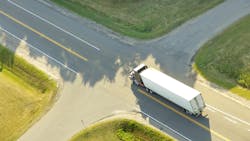We all know the importance of decarbonizing the transportation industry. The recently released U.S. National Blueprint For Transportation Decarbonization lays out a strategy for “federal leadership and partnerships to decarbonize the entire U.S. transportation sector,” according to a factsheet about the plan.
I think there are two key takeaways from the blueprint. The first is that this effort is going to take coordination and collaboration from a number of sources, including government agencies, fleets, truck makers, component manufacturers, nonprofit organizations, energy suppliers, and others. Decarbonizing transportation is a big job, and for the good of the planet, it is one we need to do in a relatively short period of time. We are going to need creative solutions to meet climate goals, and that will take all of us working together.
See also: Making alternative-fuel decisions
The second key takeaway is that we are looking at a poly-fuel future that will include battery-electric and hydrogen power as well as power from sustainable liquid fuels. There will be a place for a variety of fuel types based on vehicle duty cycles and operating conditions. At this point, there is no one technology that will work across all transportation use cases.
But we need to be aggressive about moving into each alternative where it makes sense. NACFE’s position is to go fast with battery-electric trucks in applications like vans and step vans, medium-duty box trucks, terminal tractors, and heavy-duty short regional haul.
But it also means exploring and investing in other fuels in what we call “the messy middle.” That’s the time between now and when we get to a zero-emission future. We cannot afford to be tentative in our efforts to get to zero.
See also: Slow and steady wins the race to zero emissions
We are putting the finishing touches on a white paper on the messy middle that we will release this spring. One of the messages from the paper is based on Yogi Berra’s famous line, “When you come to a fork in the road, take it.”
Action on decarbonizing trucking is needed now. We are at a point where it doesn't really matter which path you start down as long as you start. So go ahead, take that fork in the road and let all of us know what you learn from that decision. And remember, we will be here to help you navigate the challenges.
Michael Roeth has worked in the commercial vehicle industry for nearly 30 years, most recently as executive director of the North American Council for Freight Efficiency (NACFE). He serves on the second National Academy of Sciences Committee on Technologies and Approaches for Reducing the Fuel Consumption of Medium and Heavy-Duty Vehicles and has held various positions in engineering, quality, sales, and plant management with Navistar and Behr/Cummins.
About the Author

Michael Roeth
Executive Director
Michael Roeth is the executive director of the North American Council for Freight Efficiency. He serves on the second National Academy of Sciences Committee on Technologies and Approaches for Reducing the Fuel Consumption of Medium and Heavy-Duty Vehicles and has held various positions with Navistar and Behr/Cummins.
